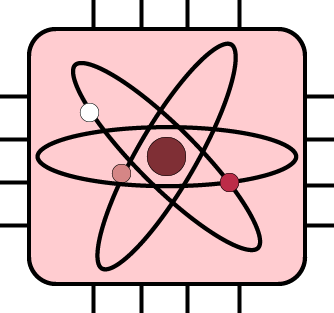In 2018, CCC recognized the need for more dialogues between quantum computing experts and experts in other fields of computer science, such as compiler design, design automation, computer architecture, and programming languages. In May of 2018, the CCC held a workshop with the goal of bridging the gap between quantum computing and classical computing, and released a report in November. This report identified a number of research challenges facing the community that demand increased attention, such as
- Practical quantum computing algorithms that can be deployed on intermediate-scale hardware to continue motivating investments in quantum computing research.
- Research on scalability and modular design of quantum systems as they are able to sustain higher qubit counts.
- Research on Best Practices for implementing and optimizing programming, mapping, and resource management that is applicable across quantum systems.
- Hybrid quantum-classical systems, and how to program and map efficiently to both sides of these systems.
- Establishing an interdisciplinary collaborative quantum computing community that includes computer scientists, physicists, and researchers working on every type of quantum system.
Since that report was published, however, there have been many developments in the field of quantum computing.
The Noisy-Intermediate-Scale-Quantum era is coming to a close, and we have begun transitioning into the future of fault-tolerant machines. With this transition comes new research questions for the computing community. In May of 2023, almost exactly 5 years later, CCC assembled quantum and classical computing experts once again to tackle these new problems in the 5 Year Update to the Next Steps in Quantum Computing workshop. This workshop, organized by Kenneth Brown (Duke University), Fred Chong (University of Chicago), Kaitlin Smith (Northwestern University and Infleqtion) and supported by Thomas Conte (Georgia Tech) focused on 5 session areas:
 1. Technologies and Architectures with a View Towards Scaling
1. Technologies and Architectures with a View Towards Scaling
2. Applications and Algorithms
3. Fault Tolerance and Error Mitigation
4. Hybrid Quantum-Classical Systems: Architectures, Resource Management, and Security, and
5. Tools and Programming Languages
We will release the report later this week, so please stay tuned!









